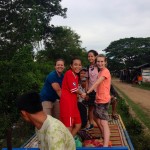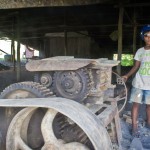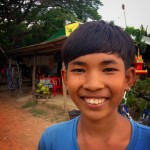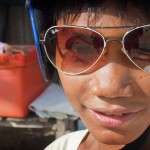 Mission to Cambodia 2014
Mission to Cambodia 2014
Patrick Haltom, Nursing student
Some days are bigger than others. Yesterday was a big day.
We began the day working with a rural community outside of Battambang, preforming skits on hand washing and the dangers of smoking. Afterwards, we toured Handa and World Mate hospital and clinic facilities where we sang hymns with some of the staff and patients. Some of us even had the opportunity to give blood, a service much needed in Cambodia. As we left the doors of the hospital, our schedule did not slow down. We then went directly to the Bamboo Train, a tourist attraction in Battambang, and this is where I want to spend most of my time writing.
Last year on the trip, I met a young man named “P.” I’m not sure how to spell his name, but I know that it is pronounced like the letter. P and I got pretty close in the short time we spent together at his village, which is a 15 minute stop on the train for tourists to buy handmade Cambodian goods and snacks. Last year P gave me a tour of his home and of the brick-making factory where his family worked. This year I was so excited to return and see P, hoping that he would remember me out of all of the white, American tourists he sees yearly.
I was disappointed upon my return. P and his family had left their home in the village. His family had moved to Poipet, Cambodia, a town near the Thailand border, and P had went to work on the border to earn more money for his family.
P’s story is not uncommon in Cambodia. Several families find themselves having no food, money, or education, and as a consequence, they move away from their homes, seeking better jobs and wages near the Thailand border. As a matter of fact, one of the organizations we have worked with this year, Freedom’s Promise, discussed with us how families will even traffic their children for labor or for sex near the border so that they can earn more money. Unfortunately, most of the families who move to the border discover that the jobs aren’t as promising as they had originally sounded. Several families are manipulated to work on the border, and when they get there, they find themselves still struggling for several of the same needs in the middle of a different cultural and class system.
Needless to say, my heart was broken when I discovered P’s move. While I did not know why he moved or if he was successful, I felt myself become very sad for this young boy who I only knew for about 15 minutes, and I found myself getting caught in my own emotion, forgetting the new people and places in front of me.
You see, there was a new boy working at the brick-making factories this year. His name was “Tet Vei,” and he was P’s friend. We began our discussion by talking about how much we both missed P, and strangely enough, I found a new relationship forming under a cloudy Cambodian sky and ever-buzzing mosquitoes. Across our language barriers, Tet Vei told me a little about himself and his family and gave me the typical tour of the factories. Too soon, our time was up, and I was climbing back onto a rigidity bamboo platform, while he was waving goodbye to me, each of us promising we would remember the other next year (Looks like I’m coming back, mom!).
In some ways, P’s absence was heavy and saddening, yet I realized that these things are not in my control. Our team is in Cambodia for only a short time. I cannot fix the poverty that forces a young boy to move to the Thailand border only to live in a different type of poverty. I cannot fix the fact that young children are working in dangerous environments, like brick-making factories, across the entire Cambodian country-side.
I am not that big.
But I can build relationships with people. I can give them hope and education. I can spend 15 minutes caring for and being genuinely interested in a young boy off the side of a railroad track. I can spend time with him to talk about dreams and ambitions and struggles and family and friends, and no one or nothing, not even mass poverty, can steal those moments.
We are here to love people, even if we are only blessed with the opportunity to love them once.




